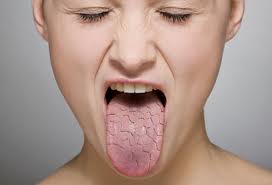This two-part article series examines a fairly common condition, dry mouth or “xerostomia” that can cause a higher risk of oral infection and tooth decay.
We’ve all at one time experienced “dry mouth”, perhaps associated with a specific medication we took or after a heavy night out! But what few people understand about this uncomfortable condition is that it can actually have a deleterious effect upon the health of your teeth and gums.
In this two-part article series, we shall be speaking to a dentist in Silver Spring about what causes dry mouth or “xerostomia”, how it can be dangerous to our oral health and what can be done to treat the condition.
The Importance of Saliva

You don’t pay any attention to saliva when it’s there, but when it’s not you’re guaranteed to notice! “Saliva plays an essential role in digestion and in protecting your teeth and gums against bacteria,” explain Silver Spring dentists. “It is your body’s inherent defense against the plethora of micro-organisms and pathogens that naturally swarm your mouth.”
Saliva:
- Contains enzymes that break down food,
- Has an anti-bacterial action, helping to control the bacteria in the mouth,
- Washes away food debris, cleansing our mouths after a meal,
- Keeps our mouth nice and moist and comfortable.
When your body doesn’t produce enough saliva, you get a condition called “xerostomia” or “dry mouth”, which may present with one or more of the following symptoms.
The Symptoms of Dry Mouth:
The most obvious symptom of this condition is the absence of saliva in the mouth, which is an uncomfortable sensation that causes:
- A dry and/or sore throat
- A sticky, dry sensation in the mouth
- Your tongue to stick to the roof of your mouth
- A tingling or burning feeling in the mouth and tongue
- Dry nasal passages
- Terrible thirst
- Halitosis, or bad breath
- Hoarseness
- Difficulty chewing, tasting and swallowing your food
- Difficulty speaking
Chronic dry mouth sufferers may even experience the development of sores in the mouth, cracked lips and split skin at the corners of the mouth in addition to a red, inflamed and parched tongue.

“It’s quite incredible just how far saliva goes to keep us comfortable and our mouths healthy,” remarks the dentist in Silver Spring. “It’s only when we suffer from a condition such as xerostomia do we become fully aware of the role it plays.”
But why exactly is “dry mouth” considered to be such a problem? What are the ramifications for our oral health in the long term?
The Long Term Repercussions of Dry Mouth
The biggest problem associated with xerostomia is infection. Saliva protects the teeth and gums against bacteria, while helping to wash away the food debris and sugary residues that these microorganisms feed upon. “Without saliva, your mouth is so much more vulnerable to bacteria and all the health concerns they cause,” explain Silver Spring dentists. These include:
- Gingivitis, or infection of the gums
- Thrush fungal infection
- Increased plaque formation
- Cavities and tooth decay
- Chronic bad breath
In fact, in the long term, xerostomia can even lead to periodontal (gum) disease and tooth loss if measures aren’t taken to protect one’s oral health.
This leaves us with two remaining pertinent questions... (1) What causes dry mouth? (2) What can be done to prevent it and/or mitigate the damage?
Stay Tuned for Part 2
Stay tuned for our next article installment in which a qualified and experienced dentist in Silver Spring will provide the answers to these pressing questions!
No comments:
Post a Comment